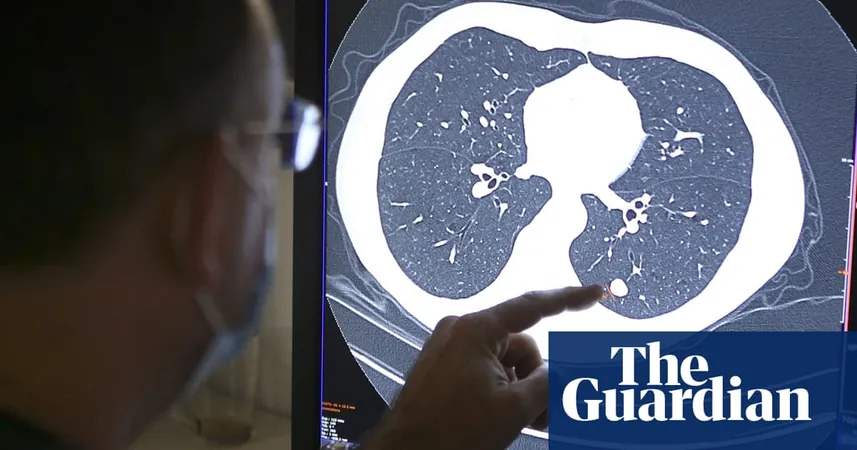
The Fascinating Quest to Uncover the Secrets of 'Super-Survivors' of Aggressive Cancers
2024-11-18
Author: Sarah
Introduction
In a groundbreaking initiative, medical experts are delving into the mysteries surrounding remarkable individuals who have defied the odds and survived long-term despite being diagnosed with some of the most aggressive cancers. A collaborative study is underway that involves eight NHS cancer centers and a network of hospitals worldwide, aiming to learn from the extraordinary cases of cancer "super-survivors."
Study Objectives
The objective of the study is to gather comprehensive biological data from about 1,000 patients who exhibit unexpected resilience to their illnesses. Researchers will meticulously analyze a plethora of factors including tumor DNA, blood proteins, microbial profiles, and molecular biomarkers. The ultimate goal? To identify the reasons behind this exceptional longevity and to harness this knowledge to improve treatments for others grappling with similar diagnoses.
Global Participation
Healthcare professionals from over 40 different countries are participating in this mammoth research effort, specifically targeting individuals with an exceptionally long survival rate after being diagnosed with extensive-stage small cell lung cancer, glioblastoma—the most aggressive brain cancer—and metastatic pancreatic ductal adenocarcinoma. Impressively, only the top 3% of patients in terms of survival after diagnosis are eligible for this study.
Expert Insights
Dr. Thankamma Ajithkumar, a consultant clinical oncologist at Cambridge University, expressed the study's urgency: “These cancer patients typically have survival expectations of two to three years. Yet, a small fraction—about 3-5%—survive much longer. The mystery remains: What genetic or tumor characteristics empower these individuals to outlive their prognosis?”
The Rosalind Study
Named after the pioneering X-ray crystallographer Rosalind Franklin, whose work was instrumental in identifying the DNA structure, the Rosalind study aims to be a beacon of hope amid the grim statistics surrounding aggressive cancer types. As Dr. Ajithkumar noted, this level of inquiry into patients who thrive against the odds is unprecedented.
Potential Explanations for Survival
The explanations behind some patients' remarkable survival may vary—it could stem from unique genetic features of their tumors that make them particularly responsive to existing cancer treatments, or even enhanced immune responses capable of neutralizing malignant cells. Researchers are eager to decode these intricate factors that contribute to exceptional cancer survivorship.
Data Management and Future Goals
Data compiled from these super-survivors will be securely stored in a global database managed by Cure51, a French biotech startup financially backed by the Paris-based venture capital firm, Sofinnova. Nicolas Wolikow, co-founder and CEO of Cure51, emphasized the initiative's potential: "Our objective is to unlock the mechanisms of survival among these individuals. With success, we could contribute not just to enhanced survival rates, but to the broader fight against cancer."
Challenges in Finding Super-Survivors
However, locating and enrolling these super-survivors remains a significant challenge. For instance, in the UK, patients who reach the five-year mark are typically discharged from care, posing difficulties for tracking subsequent health outcomes. “Finding them will indeed be a monumental task,” cautioned Dr. Ajithkumar. For those within the UK showing interest in participating, the Cambridge Cancer Trials Centre is available for contact.
Broader Implications of the Research
In a broader context, Dr. Hattie Brooks from Cancer Research UK highlighted the importance of this research. “Understanding why individuals with identical cancer types respond so differently to treatments is vital for developing more effective therapies. This study could pave the way for new approaches to combat aggressive cancers, which traditionally offer limited treatment options.”
Conclusion
The Rosalind study is still in its infancy, yet it heralds a promising advancement in our pursuit of knowledge about cancer survivorship—hinting that the future may hold novel solutions that could significantly enhance treatment paradigms for some of the deadliest forms of cancer.

 Brasil (PT)
Brasil (PT)
 Canada (EN)
Canada (EN)
 Chile (ES)
Chile (ES)
 España (ES)
España (ES)
 France (FR)
France (FR)
 Hong Kong (EN)
Hong Kong (EN)
 Italia (IT)
Italia (IT)
 日本 (JA)
日本 (JA)
 Magyarország (HU)
Magyarország (HU)
 Norge (NO)
Norge (NO)
 Polska (PL)
Polska (PL)
 Schweiz (DE)
Schweiz (DE)
 Singapore (EN)
Singapore (EN)
 Sverige (SV)
Sverige (SV)
 Suomi (FI)
Suomi (FI)
 Türkiye (TR)
Türkiye (TR)